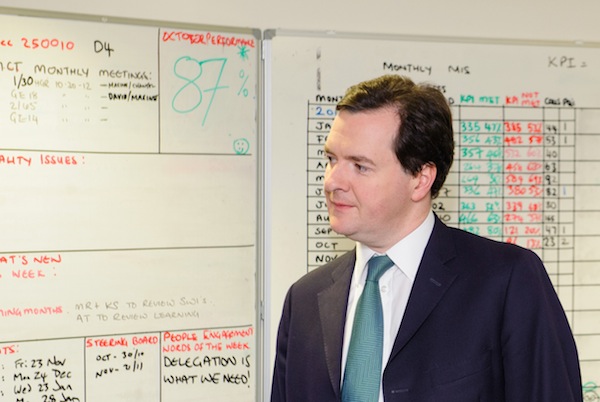George Osborne has managed, so far, to manage the run-up to the Autumn Statement far better than he did the Budget. There have been no cat fights across the pages of the newspapers, and the briefing over the past few days has been disciplined. After being told about the £5bn of Whitehall spending cuts to fund ‘shovel-ready’ projects including new schools and investment in skills, science and transport yesterday, one hack jokingly asked whether ‘this means that tomorrow’s statement is going to be horrendous’ given the news so far had been relatively positive.
Osborne’s stock is up in Westminster at the moment – something James detailed in the magazine last week – but today isn’t going to be easy by any means, even if he has postponed a feeding frenzy on the granny tax-style details that the extensive leaking of the Budget caused. He will tell MPs that there is no ‘miracle cure’, and will have to make a number of admissions that are pretty unpleasant. Austerity will last until at least 2018 because of weaker growth and higher borrowing than originally expected. He will probably have to admit that he is going to miss his key targets on cutting the deficit and having debt as a percentage of GDP falling by 2015, and it is well worth reading Jonathan’s briefing on what the Office for Budget Responsibility is likely to say on these fiscal targets. The Chancellor will say:
‘In this autumn statement, we show that this coalition government is confronting the country’s problems, instead of ducking them. The public know that there are no miracle cures Just the hard work of dealing with our deficit and ensuring Britain wins the global race.’
The real significance of the Chancellor’s admissions today will be that the Tory party now knows it cannot fight the next general election on the straightforward message that it has turned around Labour’s economic mess. The message in 2015 will now have to include a participle: ‘we are clearing up the mess that Labour left’, rather than anything as complete and perfect as ‘we have cleared up the mess’. The Tories will have to rely much more on asking voters, as Nick Clegg did at his party’s conference in September, whether they really believe that the alternative that Ed Balls is offering them would lead them beside stiller waters.
As Tim Montgomerie points out in the Times today, the Chancellor is well-regarded by colleagues, but that doesn’t mean that all his relationships with cabinet ministers are rosy. He has a job to do today just to convince his own government to support him. One relationship which is worth watching is that between Osborne and Iain Duncan Smith. The Chancellor has in the past few months managed to convince the Work and Pensions Secretary of the need for further welfare cuts when Duncan Smith had previously been adamant that spending had been squeezed sufficiently in that area. Duncan Smith can be a stubborn fighter, so it is impressive that the Chancellor has brought him on side for today’s statement. But he may yet dig his heels in if some of the cuts prove unpalatable, and he is also faced with cutting his department’s spending by 1 per cent in 2013/14 and 2 per cent in 2014/15. That will require some steel from any cabinet minister, but remember that the Work and Pensions Secretary is also trying to push through an enormous IT programme to implement universal credit when the civil service is displaying increasing reluctance to back the flagship reform. There may be trouble ahead for Osborne’s rapport with this particular colleague, at least.
It’s also worth noting that both the Chancellor and the Prime Minister’s official spokesman have been using the phrase ‘global race’ in their briefings about the Autumn Statement. Britain’s positioning in the world will be a key theme over the next couple of years as CCHQ turns on to an election footing: those working in campaign headquarters are already sick of the phrase, which shows how important it is. If you’re playing one of the many ‘Osborne bingo’ games today as you watch his statement, you could do worse than to place your bets on ‘global race’ cropping up. The Chancellor today will be running his own race to persuade voters that the Tories are the ones to trust on the economy, and to persuade colleagues to continue to back him.







Comments